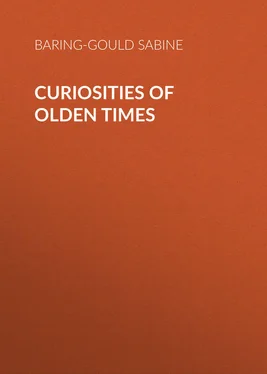Sabine Baring-Gould - Curiosities of Olden Times
Здесь есть возможность читать онлайн «Sabine Baring-Gould - Curiosities of Olden Times» — ознакомительный отрывок электронной книги совершенно бесплатно, а после прочтения отрывка купить полную версию. В некоторых случаях можно слушать аудио, скачать через торрент в формате fb2 и присутствует краткое содержание. ISBN: , Жанр: foreign_antique, foreign_prose, на английском языке. Описание произведения, (предисловие) а так же отзывы посетителей доступны на портале библиотеки ЛибКат.
- Название:Curiosities of Olden Times
- Автор:
- Жанр:
- Год:неизвестен
- ISBN:http://www.gutenberg.org/ebooks/41546
- Рейтинг книги:3 / 5. Голосов: 1
-
Избранное:Добавить в избранное
- Отзывы:
-
Ваша оценка:
- 60
- 1
- 2
- 3
- 4
- 5
Curiosities of Olden Times: краткое содержание, описание и аннотация
Предлагаем к чтению аннотацию, описание, краткое содержание или предисловие (зависит от того, что написал сам автор книги «Curiosities of Olden Times»). Если вы не нашли необходимую информацию о книге — напишите в комментариях, мы постараемся отыскать её.
Curiosities of Olden Times — читать онлайн ознакомительный отрывок
Ниже представлен текст книги, разбитый по страницам. Система сохранения места последней прочитанной страницы, позволяет с удобством читать онлайн бесплатно книгу «Curiosities of Olden Times», без необходимости каждый раз заново искать на чём Вы остановились. Поставьте закладку, и сможете в любой момент перейти на страницу, на которой закончили чтение.
Интервал:
Закладка:
This reminds one of an anecdote told of the Cardinal Dubois, whose servants came to him every New Year’s Day to present their congratulations, and to receive a New Year’s box. When the steward came in his turn, the Cardinal said to him:
Monsieur, I present you with all that you have stolen from me.
The pleasure of receiving a legacy must be generally mingled with pain, more or less intense, according to the nearness of relationship of the deceased, or the affection we have had for him: but, when a plump legacy drops into our laps from a totally unexpected quarter, and left by one for whom we did not care, or possibly whom we did not know, – the amount of pain must be very minute. Such a case was that of a lady who came in for a large fortune from an eccentric individual to whom she had never spoken, though she had seen him at the opera, or in the park. The wording of the will was:
I supplicate Miss B – to accept my whole fortune, too feeble an acknowledgment of the inexpressible sensations which the contemplation of her adorable nose has produced on me.
The following is as curious. A good citizen of Paris, who died about 1779, inserted this clause in his will:
Item : I leave to M. l’Abbé Thirty-thousand-men, 1200 livres a year: I do not know him by any other name, but he is an excellent citizen, who certified me in the Luxembourg, that the English, that ferocious people which dethrones its monarchs, will soon be destroyed.
On opening the testament, the executors were sorely puzzled to know who this Abbé Thirty-thousand-men could possibly be. At last, several people deposed that this citizen, a sworn enemy of the English and a great politician, had been wont every day to march up and down the Allé des Larmes in the Luxembourg; there he used to meet with an Abbé who had as great an abhorrence of the English as himself, and who was perpetually urging: – “Those English rascals aren’t worth a straw. 30,000 men only are wanted, – 30,000 men raised, – 30,000 embarked, – 30,000 landed, – and London would be in the hands of 30,000 men. A mere trifle!”
This was verified, and the legacy was delivered over to the intrepid Abbé, who had little dreamed of the spoil his 30,000 men were to bring him.
There is a question which we have been asking ourselves repeatedly, and which we now put before the reader. Is it possible to classify these wills? We have tried to do so, and have failed in every attempt. First, we have distributed them according to the bequests contained in them; – legacies of money, goods, animals, persons. There is no reason which can justify such an arbitrary system. Then again, when we arrange them according to the motives of the testator, as, wills indited by a perverted moral sense, or those composed under the influence of an aberration of the intellect, then we are obliged to exclude that of Corocotta Porcellus, of Jean Certain, beside many others, which can hardly be forced into position under either of these heads. And it is because the mind of man is too intricate, his motives too involved, his feelings too transient, his principles too obscure, for us to divide and subdivide the actions springing from them, as we can settle the classes of molluscs, or determine the genera of butterflies, – that in this paper we have attempted nothing of the kind. For wills are, as has been shown, as diverse as the hearts of men, of which they are the transcripts. An anatomist may dissect the heart, may name and register every muscle and fibre, – but he can tell us nothing of the motives which impelled that heart to throb faster, or chilled it to a sudden stillness. The bitterness of hate has left no poison in its cavities, in it the fleeting passion has set no seal, emotion left no trace, pity relaxed no nerve. The impulses which brought forth so full a leafage of action are lost, as the sap from the bare tree.
So surely as the berry indicates the soundness of the root, the flower of the bulb, so does man’s last will tell of the goodness or foulness of the heart which conceived it. The cankered root sends up only a sickly germ, which brings forth no fruit in due season; whilst the wine that maketh glad the heart of man, the oil which maketh him a cheerful countenance, and the bread that strengthens his heart, have burst from roots which mildew has never marred, nor worm fretted.
QUEER CULPRITS
According to Jewish law, “If an ox gore a man or a woman that they die, then the ox shall be surely stoned, and his flesh shall not be eaten: but the owner of the ox shall be quit.” After giving this command, Moses proceeds to enforce the doctrine of the responsibility of the beast’s owner, and to ensure his punishment, should he wittingly let a dangerous animal run loose; also to make provision for his security under some extenuating circumstances. These commands were carried into the laws of mediæval Europe; the jurists, at the same time, introducing refinements of their own, and enforcing them in numerous cases, which afford matter for curious inquiry, and are full of technicalities and peculiarities, at once amusing and instructive, as throwing light on the customs and habits of thought in those times.
Now take the case of a child injured by a sow, or a man killed by a bull: the trial was conducted in precisely the same manner as though sow and bull were morally criminal. They were apprehended, placed before the ordinary tribunal, and given over to execution.
Again: an inroad of locusts or snails takes place. Common law is helpless, it may pronounce judgment, but who is to execute its decrees? Temporal power being palpably unavailing, the spiritual tribunal steps in; the decision of the magistrates being useless, perhaps excommunication may suffice. This, then, was an established maxim. If the criminal could be reached, he was handed over to the ordinary courts of justice; if, however, the matter was beyond their control, he fell within the jurisdiction of Ecclesiastical Courts. Poor culprit, not a loophole left by which to escape!
Let us consider the manner of proceeding under the former circumstance. A bull has caused the death of a man. The brute is seized and incarcerated; a lawyer is appointed to plead for the delinquent; another is counsel for the prosecution. Witnesses are bound over, the case is heard, and sentence is given by the judge, declaring the bull guilty of deliberate and wilful murder; and, accordingly, that it must suffer the penalty of hanging or burning.
The following cases are taken from among numerous others, and will afford examples:
A.D. 1266. A pig burned at Fontenay-aux-Roses, near Paris, for having devoured a child.
1386. A judge at Falaise condemned a sow to be mutilated in its leg and head, and then to be hanged, for having lacerated and killed a child. It was executed in the square, dressed in man’s clothes. The execution cost six sous, six deniers, and a new pair of gloves for the executioner, that he might come out of the job with clean hands.
1389. A horse tried at Dijon, on information given by the magistrates of Montbar, and condemned to death, for having killed a man.
1499. A bull was condemned to death at Cauroy, near Beauvais, for having in a fury “occis” a little boy of fourteen or fifteen years old.
A farmer of Moisy let a mad bull escape. The brute met and gored a man so severely that he only survived a few hours. Charles, Count de Valois, having heard of the accident whilst at his château of Crépy, ordered the bull to be seized and committed for trial. This was accordingly done. The officers of the Count de Valois gathered all requisite information, received the affidavits of witnesses, established the guilt of the bull, condemned it to be hanged, and executed it on the gibbet of Moisy-le-Temple. The death of the beast thus expiated that of the man. But matters did not stop here. An appeal against the sentence of the Count’s officers was lodged before the Candlemas parliament of 1314 – drawn up in the name of the Procureur de l’Hôpital at Moisy, declaring the officers to have been incompetent judges, having no jurisdiction within the confines of Moisy, and as having attempted to establish a precedent. The parliament received and investigated the appeal, and decided that the condemnation of the bull was perfectly just, but found that the Count de Valois had no judicial rights within the territory of Moisy, and that his officers had acted illegally in taking part in the affair.
Читать дальшеИнтервал:
Закладка:
Похожие книги на «Curiosities of Olden Times»
Представляем Вашему вниманию похожие книги на «Curiosities of Olden Times» списком для выбора. Мы отобрали схожую по названию и смыслу литературу в надежде предоставить читателям больше вариантов отыскать новые, интересные, ещё непрочитанные произведения.
Обсуждение, отзывы о книге «Curiosities of Olden Times» и просто собственные мнения читателей. Оставьте ваши комментарии, напишите, что Вы думаете о произведении, его смысле или главных героях. Укажите что конкретно понравилось, а что нет, и почему Вы так считаете.












